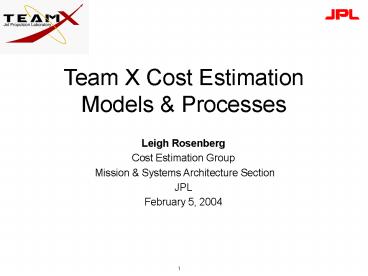The Advanced Spacecraft Conceptual Design Process - PowerPoint PPT Presentation
1 / 13
Title:
The Advanced Spacecraft Conceptual Design Process
Description:
1. Team X Cost Estimation Models & Processes. Leigh Rosenberg. Cost Estimation Group ... Improve the speed and quality of JPL's new mission concepts. ... – PowerPoint PPT presentation
Number of Views:128
Avg rating:3.0/5.0
Title: The Advanced Spacecraft Conceptual Design Process
1
Team X Cost Estimation Models Processes
Leigh Rosenberg Cost Estimation Group Mission
Systems Architecture Section JPL February 5, 2004
2
Outline
- What is Team X?
- How does Team X estimate costs?
3
What is Team X?
- The Advanced Projects Design Team (Team X) was
started in April of 1995. The team is chartered
to - Improve the speed and quality of JPLs new
mission concepts. - Create a reusable study process with dedicated
facilities, equipment, procedures, and tools. - Develop a database of initial mission
requirements that can be easily updated and
electronically transferred for use in subsequent
project phases. - Develop mission generalists from a pool of
experienced engineers. - 600 completed studies to date
4
Concurrent Design Process
Old Process Sequential
New Process Concurrent
Subsystem Design
System Trades
Cost
5
Design Team Tools
6
(No Transcript)
7
Team-X ProcessMission Design Studies
- Pre-meeting preparation
- Mission/science objective is defined
- Measurement objectives and instrument
requirements are defined - Mission design and instrument specification
- Concurrent engineering design sessions
- Customer presents mission/science objectives
- Team reviews mission requirements
- Team identifies requirements and trades
- Mission and system design is developed
- Option trade studies
- Mission cost development based on input from Team
X Subsystem chairs in combination with parametric
models.
8
Team-X ProcessDesign Reviews
- Pre-meeting preparation
- Collect design information proposal text,
equipment lists - Subsystem engineers read relevant material and
perform preliminary validation analyses - Concurrent engineering review session
- Customer presents mission/science objectives
- Team reviews mission requirements
- Team identifies system requirements flow down
- Mission and system design is entered into the CEM
tool - Subsystem engineers report their review results
- Mission cost estimate is developed using Team X
models - less rigorous input from subsystems
9
Team-A ProcessQuick study - Lower cost, less
detail
- Pre-meeting preparation
- Mission/science objective is defined
- Mission design and instrument specification
- Concurrent engineering design sessions
- Customer presents mission/science objectives
- Subset Team reviews mission requirements
- Subset Team identifies requirements and trades
- Mission and system design is developed subsystem
concepts are by analogy and model instead of by
design - Option trade studies
- Mission cost estimate made by analogy and models
(e.g., JPL Technical Cost Database, Parametric
Mission Cost Model (PMCM))
10
Team X Cost Process Estimating the Flight System
Secondary WBS Items aka Wraps
Flight Subsystem Cost Estimates (Quasi Grassroots)
Systems Level Spacecraft bus management system
engineering. Percentage of the individual flight
system cost based on size of mission.
Power, Thermal, Attitude Control, Structures,
Telecommunications, Ground Systems, Propulsion,
Computers Data Handling, Testbeds, Software
Project Level Costs
ATLO Parametric equation that computes element
ATLO based on total cost of instruments and
spacecraft bus.
Payload Payload management system engineering.
Percentage on the total payload cost if more than
one instrument is on spacecraft.
Instruments (parametric)
11
Team X Cost Process Estimating the Project Life
Cycle Cost
Secondary WBS Items aka Wraps
Mission Assurance of (Development Reserves-PM)
Project Management of (Development Reserves)
Reserves of (Development Reserves) of
(Operations Reserves)
Project Management of (Operations Reserves)
Team X LCC Estimate
Info Sys. Engineering Comm of Total Project
Workforce Configuration Management of Total
Project Workforce
Education/Public Outreach of (LCC Reserves-LV)
Launch Vehicle (no wraps or reserves)
Costs of Flight Subsystem Elements
12
Team X Sample Cost Output
13
Team X Sample Cost Output































